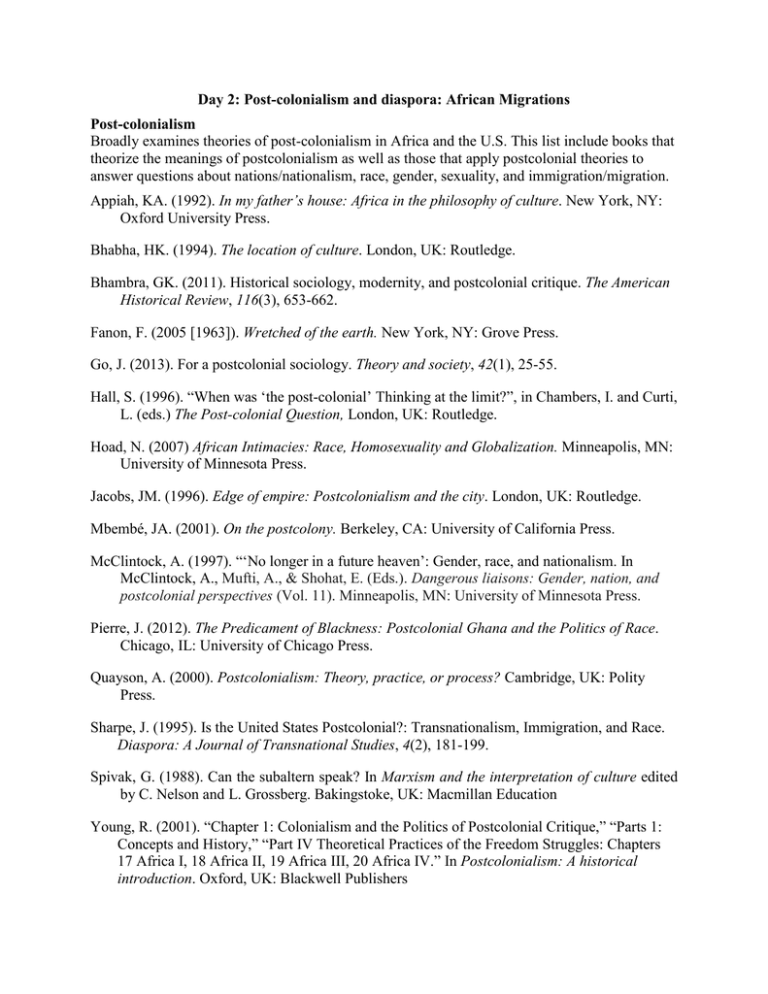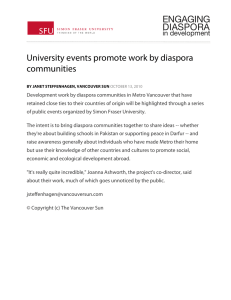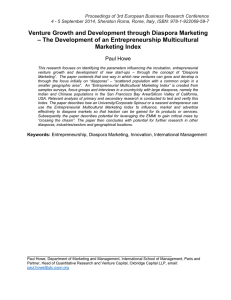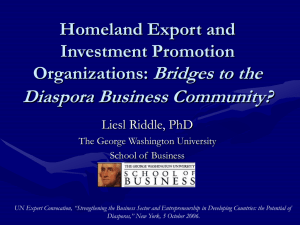
Day 2: Post-colonialism and diaspora: African Migrations
Post-colonialism
Broadly examines theories of post-colonialism in Africa and the U.S. This list include books that
theorize the meanings of postcolonialism as well as those that apply postcolonial theories to
answer questions about nations/nationalism, race, gender, sexuality, and immigration/migration.
Appiah, KA. (1992). In my father’s house: Africa in the philosophy of culture. New York, NY:
Oxford University Press.
Bhabha, HK. (1994). The location of culture. London, UK: Routledge.
Bhambra, GK. (2011). Historical sociology, modernity, and postcolonial critique. The American
Historical Review, 116(3), 653-662.
Fanon, F. (2005 [1963]). Wretched of the earth. New York, NY: Grove Press.
Go, J. (2013). For a postcolonial sociology. Theory and society, 42(1), 25-55.
Hall, S. (1996). “When was ‘the post-colonial’ Thinking at the limit?”, in Chambers, I. and Curti,
L. (eds.) The Post-colonial Question, London, UK: Routledge.
Hoad, N. (2007) African Intimacies: Race, Homosexuality and Globalization. Minneapolis, MN:
University of Minnesota Press.
Jacobs, JM. (1996). Edge of empire: Postcolonialism and the city. London, UK: Routledge.
Mbembé, JA. (2001). On the postcolony. Berkeley, CA: University of California Press.
McClintock, A. (1997). “‘No longer in a future heaven’: Gender, race, and nationalism. In
McClintock, A., Mufti, A., & Shohat, E. (Eds.). Dangerous liaisons: Gender, nation, and
postcolonial perspectives (Vol. 11). Minneapolis, MN: University of Minnesota Press.
Pierre, J. (2012). The Predicament of Blackness: Postcolonial Ghana and the Politics of Race.
Chicago, IL: University of Chicago Press.
Quayson, A. (2000). Postcolonialism: Theory, practice, or process? Cambridge, UK: Polity
Press.
Sharpe, J. (1995). Is the United States Postcolonial?: Transnationalism, Immigration, and Race.
Diaspora: A Journal of Transnational Studies, 4(2), 181-199.
Spivak, G. (1988). Can the subaltern speak? In Marxism and the interpretation of culture edited
by C. Nelson and L. Grossberg. Bakingstoke, UK: Macmillan Education
Young, R. (2001). “Chapter 1: Colonialism and the Politics of Postcolonial Critique,” “Parts 1:
Concepts and History,” “Part IV Theoretical Practices of the Freedom Struggles: Chapters
17 Africa I, 18 Africa II, 19 Africa III, 20 Africa IV.” In Postcolonialism: A historical
introduction. Oxford, UK: Blackwell Publishers
Diaspora
Classical theories of diaspora and identity, this list examines the formations of diaspora and the
various meanings of diaspora and diasporic identities. These books also examine the relationship
between nation and diaspora with a focus on race/ethnic identities, gender, and sexuality.
Anthias, F. (1998). Evaluating Diaspora: Beyond ethnicity? Sociology. 32(2): 557-580.
Clark, KM & Thomas, DA (2006). Introduction: Globalization and the transformations of race.
In Clark, KM & Thomas, DA (eds) Globalization and Race. Durham, NC: Duke University
Press.
Ifekwunigwe, JO. (2006). Recasting ‘Black Venus’ in the new African diaspora. In Clark, KM &
Thomas, DA (eds) Globalization and Race. Durham, NC: Duke University Press.
Clifford, J. (1997). “1. Traveling cultures”, “10. Diasporas.” In Routes: Travel and Translation
in the Late Twentieth Century. Cambridge, MA: Harvard University Press.
Cohen, R. (2008). “1. Four phases of diaspora studies,” “3. Victim diasporas: Africans and
Armenians,” “7. Deterritorializing Diaspora: the black Atlantic and the lure of Bombay,”
“8. Mobilizing diasporas in a global age,” “9. Studying diasporas: Old methods and new
topics.” In Global diasporas: An introduction. London, UK: Routledge.
Dufoix, S. (2008). Diasporas. Berkeley, CA: University of California Press.
Edwards, BH. (2001). The uses of diaspora. Social Text, 19(1), 45-73.
Gilroy, P. (1997). Diaspora and the detours of identity. In Woodward, K. (Ed.) Identity and
difference (Vol. 3). London, UK: Sage.
Gopinath, G. (2005). Impossible desires: Queer diasporas and South Asian public cultures.
Durham, NC: Duke University Press.
Hall, S. (1990). Cultural identity and diaspora. Identity: Community, culture, difference, 2, 222237.
Hanchard, M. (1999). Afro-modernity: Temporality, politics, and the African diaspora. Public
Culture, 11(1), 245-268.
Hesse, B. (1997). It's your world: Discrepant M/Multiculturalisms. Social Identities, 3(3), 375394.
Lao-Montes, A. (2007). Decolonial moves: Trans-locating African diaspora spaces. Cultural
Studies, 21(2-3), 309-338.
Mumford, K. (2009). Black Global Metropolis: Sexual History. Radical History Review,
103(Winter 2009): 175-186.
Takyi, BK. (2009). Africans abroad: Comparative perspectives on America’s postcolonial West
Africans. In Okpewho I & Nzegwu N. (Eds.) The New African Diaspora. Bloomington, IN:
Indiana University Press.
Thomas, DA. (2009). The Violence of Diaspora: Governmentality, Class Cultures, and
Circulations. Radical History Review, 103(Winter 2009): 83-104.
Wright, MM. (2003). Becoming Black: Creating identity in the African diaspora. Durham, NC:
Duke University Press.
Zeleza PT (2009) Diaspora dialogues: engagements between Africa and its Diasporas. In I.
Okpewho & N. Nzegwu (Eds.), The New African Diaspora. Bloomington, IN: Indiana
University Press.
Immigration/Migration
Includes theories of migration and immigration with a focus on gender, sexualities and race.
These books are concerned with how immigration/migration (trans)forms identities and changes
geographic, economic, and social landscapes.
Alba, R. & Nee, V. (2003). Remaking the American mainstream: Assimilation and
contemporary immigration. Cambridge, MA: Harvard University Press.
Arthur, JA, Takougang, J, & Owusu, T. (2012). Africans in global migration: Searching for
promised lands. Plymouth, UK: Lexington Books
Arthur, JA. (2009) African women immigrants in the United States. New York, NY: Palgrave
McMillan.
Back, L. (2013). New ethnicities and urban cult: Racism and multiculture in young lives.
London, UK: Routledge.
Bloemraad, I., Korteweg, A., & Yurdakul, G. (2008). Citizenship and immigration:
Multiculturalism, assimilation, and challenges to the nation-state. Sociology, 34(1), 153.
Cantú, L. (2009). The sexuality of migration: Border crossings and Mexican immigrant men.
New York, NY: NYU Press.
David, L., Halberstam, J., & Muñoz, E. (2005). What’s Queer About Queer Studies Now? Social
Texts, 84 – 85, Vol. 23, Nos. 3 – 4
Epstein, S., & Carrillo, H. (2014). Immigrant sexual citizenship: intersectional templates among
Mexican gay immigrants to the USA. Citizenship Studies, 18(3-4), 259-276.
Glick-Schiller, N, Basch L, & Blanc CS. (1995). From immigrant to transmigrant: Theorizing
transnational migration. Anthropological Quarterly, Vol. 68, No. 1, 48-63.
Gonzalez-Lopez, G. (2005). Erotic journeys: Mexican immigrants and their sex lives. Berkeley,
CA: University of California Press.
González-López, G. (2006). Heterosexual fronteras: immigrant Mexicanos, sexual
vulnerabilities, and survival. Sexuality Research & Social Policy, 3(3), 67-81.
Hagan, J. (1998). Social networks, gender and immigrant settlement: Resource and constraint.
American Sociological Review. Volume 63 (1): 55-67. February.
Hampshire, J. (2013). The politics of immigration: contradictions of the liberal state. Cambridge,
UK: Polity Press.
Hondagneu-Sotelo, P. (2003). Gender and migration: A retrospective and introduction. In
Hondagneu-Sotelo, P. (editor), Gender and U.S. Immigration: Contemporary Trends,
Berkeley, CA: University of California Press.
Levitt, P., & Waters, M. C. (Eds.). (2006). The changing face of home: The transnational lives of
the second generation. New York, NY: Russell Sage Foundation.
Luibhéid, E. (2008). Sexuality, migration, and the shifting line between legal and illegal status.
GLQ: A Journal of Lesbian and Gay Studies, 14(2-3), 289-315.
Luibhéid, E., & Cantú Jr, L. (2005). Queer migrations: Sexuality, US citizenship, and border
crossings. Minneapolis, MN: University of Minnesota Press.
Pessar, PR. (2003). Engendering migration studies: The case of new immigrants in the United
States. In Hondagneu-Sotelo, P. (editor), Gender and U.S. Immigration: Contemporary
Trends, Berkeley, CA: University of California Press.
Portes, A., & Rumbaut, RG. (2014, 4th edition). Immigrant America: a portrait. Berkeley, CA:
University of California Press.
Puar, JK. (2007). Terrorist assemblages: Homonationalism in queer times. Durham, NC: Duke
University Press.
Singer A., & Gilbertson G. (2003). “The blue passport”: Gender and the social process of
naturalization among Dominican immigrants in New York City. In Hondagneu-Sotelo, P.
(editor), Gender and U.S. Immigration: Contemporary Trends, Berkeley, CA: University of
California Press.
Toro-Morn MI & Alicea M. (2003). Gendered geographies of home: Mapping second and third
generation Puerto Ricans’ sense of home. In Hondagneu-Sotelo, P. (editor), Gender and
U.S. Immigration: Contemporary Trends, Berkeley, CA: University of California Press.



